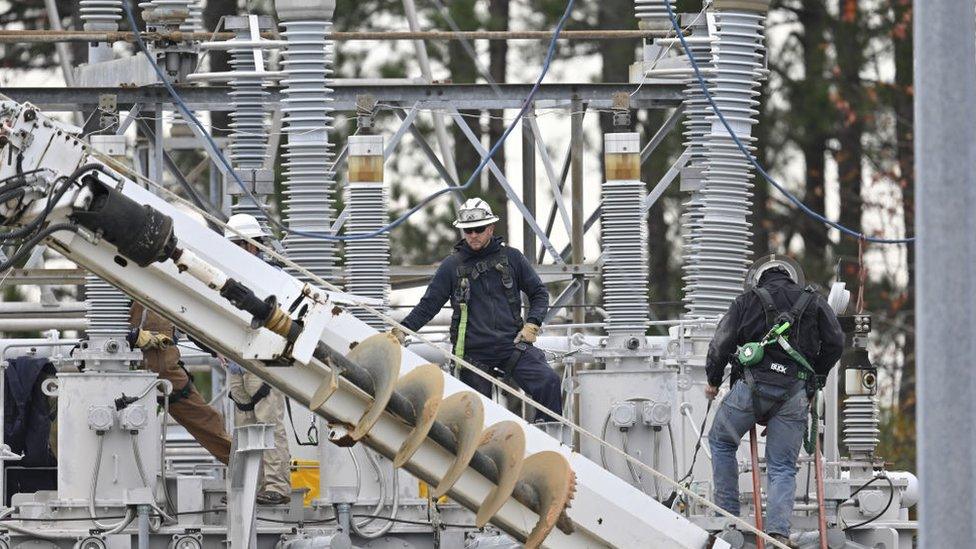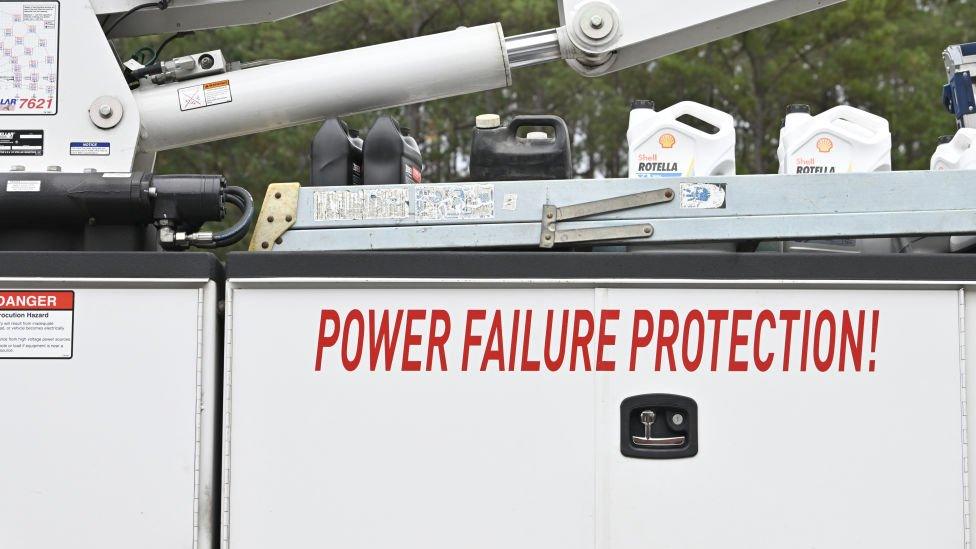How the US power grid is a target for far-right groups
- Published

Workers repair damage after an attack on a power station in North Carolina in December 2022
Far-right groups are increasingly talking about attacking the US power grid to cause chaos and advance their cause, terrorism experts say.
The warnings come as the founder of a neo-Nazi group and a woman appeared in court on Friday charged with plotting to attack power installations around Baltimore.
Brandon Russell, 27, and Sarah Clendaniel, 34, both pleaded not guilty. They face up to 20 years in prison if convicted.
In messages revealed in court filings, Ms Clendaniel described their alleged plot as "legendary" and hoped it "would completely destroy the whole city".
The pair were arrested before the alleged attack was carried out. Prosecutors said thousands would have been left without power if it had gone ahead.
Attacks against infrastructure are a long-standing obsession of far-right and white nationalist groups, and they are increasingly being discussed in extremist spaces online.
Veryan Khan, president and CEO of the Terrorism Research & Analysis Consortium (Trac) says attacks are "not a matter of if, it's when".
Recent attacks
In addition to the alleged Baltimore plot, investigators are looking into several recent attacks on power installations, including incidents in North Carolina, Oregon and Washington state.
The North Carolina attack, in Moore County in early December, knocked out power to 35,000 people for several days. Nobody has been arrested and the investigation is ongoing.

Authorities say there's no known connection between the alleged Baltimore plot and the North Carolina attack, and the motive for most of the other attacks is unknown.
Mr Russell is the founder of Atomwaffen Division, a neo-Nazi group that has been linked to murders, bombings and plots in the United States and other countries. It is banned in the UK and Canada. He spent time in prison on explosive charges, and while locked up met Ms Clendaniel, who was convicted of armed robbery, according to an indictment.
Once they were released, the pair allegedly began planning to attack electricity substations in the Baltimore area, looking at openly available material about power stations and attempting to obtain a gun. But - prosecutors claim - a person who they thought was a potential co-conspirator was actually an FBI source.

Sarah Clendaniel pictured in a photo released by prosecutors
In 2020, five men, including three former US Marines, were indicted on weapons and conspiracy charges. Authorities said they had plotted to attack the power grid during a meeting in Ohio. The following year, three white nationalists pleaded guilty, external to plotting to attack power installations.
Atomwaffen and many other white nationalist groups subscribe to a philosophy known as accelerationism, which experts believe may have motivated the attacks - and may drive plots for additional ones.
What is accelerationism?
Accelerationism is a belief that society is inherently unstable and that individuals and groups should aim to increase that instability and push for collapse in order to revolutionise society.
It's not exclusive to far-right groups, and does not necessarily involve violence, but it is used with particular motivational effect in white supremacist circles, says Ms Khan of Trac.
"Their main point is to collapse society so they can rebuild for the white man," she says.
Bennett Clifford, of the Program on Extremism at George Washington University, co-wrote a paper last year that analysed jihadist and white nationalist attacks, and concluded that since 2016, "white supremacist plots targeting energy systems dramatically increased in frequency".
The report tallied 11 cases of white nationalists arrested and charged in federal court with planning attacks on the energy sector after 2020.
"The chance that someone is able to pull off an attack of this nature is substantial," Mr Bennett says, "and more substantial than it has been in recent years."
Violent propaganda
One key indicator is that online chatter has been rising sharply.
"In terms of noise level, the pounding of the drum is almost deafening," Ms Khan said.
Last summer a loosely organised white nationalist, eco-fascist group called Terrorgram issued a document called The Hard Reset. The BBC has obtained a copy.
The title is a direct reference to The Great Reset, a World Economic Forum post-pandemic economic recovery plan.
The documents combines violent propaganda and instructions on how to carry out attacks. It includes prominent sections on power installations, rail and roads, and other infrastructure.
"Even before the publication came out, we were seeing memes about critical infrastructure, including how to identify what to attack, and how to carry out an attack," says Stacey Casas, specialty teams manager at The Counterterrorism Group, a security firm. "We're at a high level of concern."

There were about 170 instances of attacks, vandalism or suspicious activity around US power installations in 2022, a rise from about 100 the previous year, according to Department of Energy records.
Those figures include vandalism, criminal activity unrelated to extremism, and other motives, according to a department spokesperson, adding that the department works with utility companies to help assess threats against the country's 75,000 electricity substations.
Deliberate attacks against the power grid are just one threat the authorities are focused on along with the possibility of cyber-attacks, natural disasters and climate change.
Government and law enforcement officials have repeatedly issued warnings, including in a Department of Homeland Security advisory, external issued shortly before the North Carolina attack.